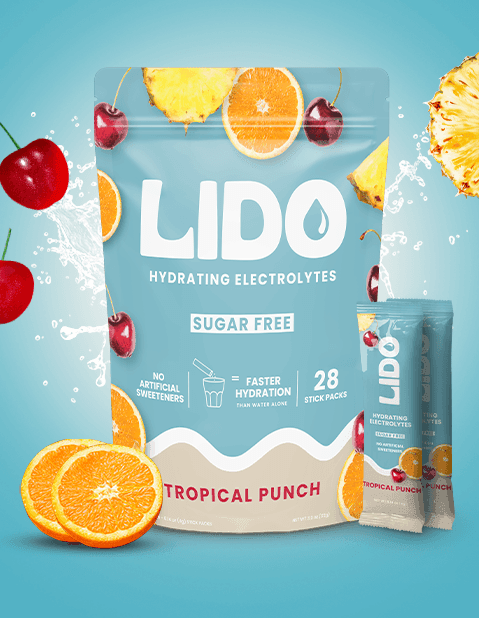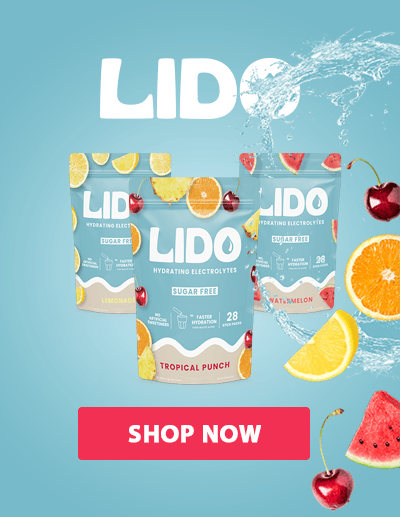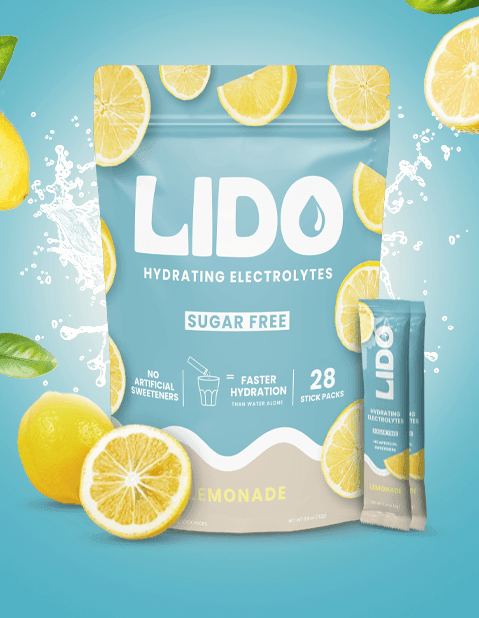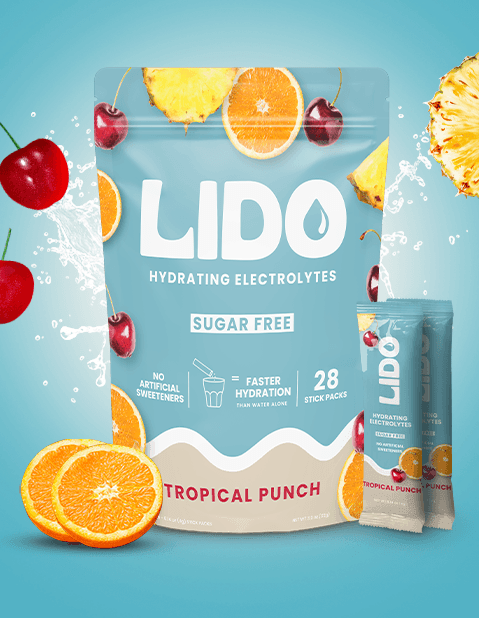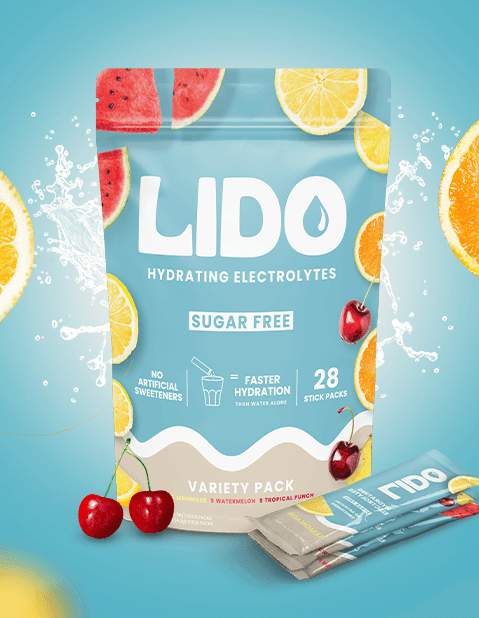How Much Water Should You Drink Daily to Stay Hydrated?
Jennifer DouglasShare
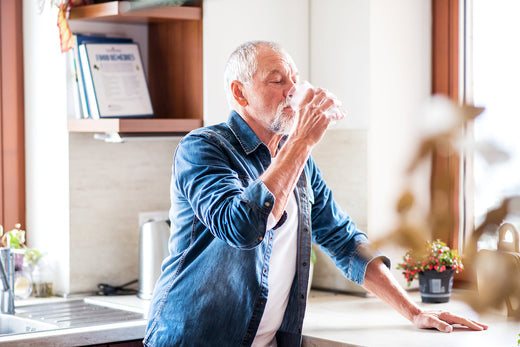
“Drink eight glasses of water a day!” You’ve probably heard it countless times from coaches, influencers, physicians, or that one health-obsessed friend or family member. Supposedly, it’s a surefire way to stay hydrated and maintain good health.
Many have followed this advice for years without questioning its origins or why we need that amount of water. Apparently, there’s no medical evidence to back it up. Furthermore, research shows that no specific water requirement always suits everyone.
So, if eight glasses a day isn’t the sweet spot for all of us, how much water should we have? We answer this and other questions in this article.
Benefits of Drinking Water Every Day
Water isn’t called “the elixir of life” for no reason—this life-giving liquid is crucial for many bodily functions. It’s a vital part of staying happy, healthy, and hydrated.
But here’s the catch: our bodies constantly lose water throughout the day, mainly through urination, sweating, breathing, metabolizing food into energy, and other functions. Your health can quickly deteriorate if you don’t replace that lost fluid.
Unlike food, where you can survive without it for as long as three weeks or more, your body will start shutting down in about three days without water.
Health Benefits of Drinking Water
Drinking water should be a top priority for anyone looking to maintain a healthy lifestyle. Plain water doesn’t contain calories, sugar, carbs, or other stuff that could dehydrate you or cause sickness. It also comprises around 60 percent of the adult human body (about 11 gallons or 92 pounds inside a 155-pound person), including almost two-thirds of your brain and heart, 83% of your lungs, 64% of your skin, and 31% of your bones.
According to the Harvard Medical School Special Health Report 6-Week Plan for Health Eating, water is involved in various crucial processes in the body, including:
- waste removal through urination, sweat, and bowel movements
- regulating body temperature and normalizing blood pressure
- carrying nutrients and oxygen to your cells
- maintaining electrolyte (sodium) balance
- flushing toxins from the body
- protecting organs and tissues
- preventing constipation and aiding digestion
- cushioning and lubricating joints
A couple of other perks? Water is necessary for brain health and functioning, supporting learning, thinking, reasoning, remembering, and problem-solving.
Every cell, tissue, and organ in your body needs water to work correctly. Skimp on your hydration, and you risk becoming dehydrated—a condition where your body lacks enough fluids to perform routine functions.
Signs You Might Be Dehydrated
While dehydration doesn’t always trigger distinct symptoms (at least in the early stages), mild to moderate cases in adults and children often include the following, according to Harvard Health:
- Thirst
- Headache
- Dry mouth (susceptible to bad breath and cavities)
- Less frequent urination
- Dark-colored urine
- Dry skin (more prone to wrinkles)
- Dizziness, tiredness, or fatigue
Once you get severely dehydrated, the symptoms tend to worsen. “If someone has severe dehydration, their heart rate increases, they may feel confused or get a fever, they will move slower than usual and have trouble walking, and they may have a drop in blood pressure or even pass out,” explains Natasha Bhuyan, MD, a family medicine specialist.
Being dehydrated may also overwhelm the heart. When your body has less water than usual, your blood volume decreases. As a result, your heart has to work harder to pump enough blood and oxygen to your organs and muscles (which explains why exercising while dehydrated feels so exhausting).
How Much Water Do You Need to Drink Daily to Stay Hydrated?
Unfortunately, there isn’t a one-size-fits-all rule regarding how much water to drink every day. “It is too difficult to recommend a daily amount of fluid that everyone should ingest, and individual needs change daily,” explains Matt Ganio, an associate professor who directs the lab in the Health, Physical Education and Recreation Building. “Even if we had an ‘accurate’ amount, it is very impractical for an individual to measure and track how much fluid they are taking in each day,” he adds.
However, there are general recommendations on how much to drink per day. For instance, the National Academy of Science, Engineering, and Medicine recommends the following daily hydration goals for adults:
- Men:7 liters (125 ounces or about 15.5 cups)
- Women:7 liters (91 ounces or about 11.5 cups)
These amounts account for fluids from food consumed throughout the day (think watermelon, strawberries, oranges, cucumbers, etc.). So, if you’re not reaching that amount daily, you might still be close or even over, as about 20% of our water consumption comes from food.
Of course, we’re all different, so our hydration needs can vary. Some people might feel hydrated by drinking less than recommended above, while others might need more.
How Can You Tell If You’re Drinking Enough Water (Or Too Little)?
Your urine is a great visual indicator of how hydrated you are. So, pay attention to how often you’re urinating and the color of your pee.
A healthy adult bladder can hold a maximum of 500 ml of urine in women and 700 ml in men (or about 17 and 24 ounces, respectively). According to the Cleveland Clinic and Mayo Clinic, peeing six to seven times a day (or roughly every 2.5 hours) is normal; anything far outside that range could be your body crying out for help.
Peeing less than 400 ml per day or less than 20 ml per hour as an adult could indicate oliguria, the medical term for low urine output (with links to dehydration, per Healthline).
On the flip side, if you’re urinating too often and excessively and your pee is clear, you might be drinking more water than your body needs. In some cases, however, you might be dehydrated, particularly if you’re peeing a lot and your urine is highly concentrated.
If your pee has a dark color resembling Pale Ale beer or Guinness stout, you’re probably not drinking enough water or are taking vitamin C or B-complex vitamins, according to MedlinePlus. Experts recommend that you drink enough to keep your urine clear or light yellow but not so much that you spend all day in the bathroom.
The best way to determine the amount of water you need is to work closely with your medical provider. They’ll be able to assess your needs based on the above-mentioned factors and likely provide a specific number you should aim for each day (for example, 5 cups on regular days and 9 cups when you are most physically active).
However, remember that you might need more or less water in some cases.
Reasons You Might Need to Drink More Water Each Day
Sometimes, you’ll need more than the general recommendations for daily water intake, such as if:
- You live in a hot or dry climate: The hotter and more humid the weather, the more water and electrolytes you lose as sweating increases. As such, you’ll need to drink more water to replace the lost fluids. Similarly, you must ramp up your daily water intake if you live in dry climates like deserts or high altitudes.
- You have an active job: A job that keeps you on the go (especially outdoors in the sun or hot temperatures or in a heated room) can help you maintain and improve your physical health as you perform your daily duties. However, the more active you are (and the hotter your work environment), the thirstier you might feel, the more you sweat, and the more water you’ll need to replenish the lost fluids.
- You are physically active: Perhaps you don’t have an active job but exercise a lot or engage in recreational activities that make you sweat. If so, you’ll need more water to cover the fluid loss. Also, hydrate before, during, and after your workouts to stave off dehydration.
- You’re pregnant or breastfeeding: According to BabyCenter, “During pregnancy, your body needs more water to cope with the demands of your changing body. Not drinking enough water can cause dehydration.” They also explain that, “Dehydration during pregnancy can also cause other symptoms such as headaches, nausea, cramps, edema and dizziness.” Furthermore, human breast milk is about 87% water, so extra water is needed to support breast milk production.
- You have a medical condition: If you have an infection, a fever, or lose fluids through vomiting or diarrhea, you will need to drink more water. If you have a health condition like diabetes, you will also need more water. Some medications, like diuretics, can also increase water loss.
Tips for Staying Hydrated Throughout the Day
Now that you know how much water to aim for daily to stay hydrated, you’re probably wondering how to go about it. Whatever your hydration goal or lifestyle, there are various guidelines you can follow to ensure proper hydration every day.
Start Slow and Keep It Steady
If drinking decent amounts of water is new for you, starting slowly and easing your way into it is the way to go. Take stock of where you are on your journey and your current habits, and set a reasonable target to work toward.
Add Flavor
For some people, drinking plain water all day can get boring. If you’re one of them, jazz up your water with slices of fruit like lemon, lime, or oranges, or delicious electrolyte mixes like Lido. These add-ins provide extra health-boosting vitamins and minerals. They may also make drinking water more enjoyable and increase the chances of smashing your daily hydration goal.
Ensure You’re Getting Enough Electrolytes
When you sweat, urinate, or even breathe, you don’t just lose water but also essential electrolytes, including sodium, potassium, and magnesium. The same happens when you have digestive upsets like diarrhea or vomiting. So, besides drinking more water, you might need to incorporate electrolytes into your hydration routine.
Electrolytes are minerals that conduct electrical impulses and are primarily found in bodily fluids like blood. They help perform a myriad of tasks in the body, such as aiding muscle function, balancing pH and blood pressure, helping combat illness, and supporting hydration.
Sodium is the most well-known and most important electrolyte for keeping you hydrated. When you drink water, it hangs out in the bloodstream, outside the cells. The sodium then swoops in and carries that fluid into your cells. Therefore, a diet low in sodium can increase your risk of dehydration.
Research shows sodium helps your body retain more fluid, which could curb dehydration and boost your hydration status. Without enough sodium, water will only pass through your body and not hydrate you.
Adding sodium and other electrolytes to your water could help restore your fluid balance and replenish the minerals lost due to normal body functions and physical activities like exercise.
The Speed and Convenience of Electrolyte Mixes for Hydration
One way to get your daily dose of electrolytes is through electrolyte drink mixes. They have become incredibly popular for how quickly and conveniently they can hydrate you.
Let’s dig a bit deeper into what makes these products so special.
Easy and Efficient Hydration with Electrolyte Mixes
- Rapid Absorption: Unlike solid foods that generally take six to eight hours to absorb into the bloodstream, the powdery composition of (some) electrolyte mixes allows the body to absorb them much faster. This hydrates your body much more quickly and efficiently than drinking water alone.
- Optimal Hydration: Most electrolyte mixes contain a just-right blend of sodium, potassium, and magnesium, though the exact quantities may vary from one brand to another. Adding these supplements to your diet can quickly replenish lost electrolytes to prevent dehydration and its associated symptoms—a massive benefit for folks who engage in intense physical activity, have an illness that causes vomiting or diarrhea, or live in hot conditions.
- Energy Boost: While the electrolytes themselves won’t increase your energy levels, some electrolyte mixes include a few grams of glucose or other carbohydrates to provide the body with a quick energy source and give the beverage a subtle, refreshing flavor. Research shows that sugar speeds up the absorption process and could also improve exercise performance.
The Convenience of Electrolyte Mixes
- Portability: Electrolytes are typically available in premade forms, such as ready-to-drink liquid and powders and tablets you mix into water before drinking it. Electrolyte powders, in particular, usually come in compact, individual packets, so they’re super accessible and easy to travel with. You can keep a stash in your bag to instantly hydrate after an intense workout or other physical activity.
- Easy Preparation: Most electrolyte mixes can fully dissolve in water or juice within seconds with a little stirring or shaking (though tablets may take a bit longer). So, if you lead a busy lifestyle, you’ll love the convenience of tearing open a packet, pouring in the powder, mixing it up in your water bottle, and sipping away wherever you are—at the gym, on a hike, or traveling. Or better yet, you can pre-mixed a bottle of your favorite electrolyte mixes and take it with you.
- Flavors Galore: As far as taste goes, electrolyte mixes can be flavored or unflavored. The flavored ones usually have a hint of citrus, berry, watermelon, cola, or even chocolate, making it more enjoyable to stay hydrated, especially for those who find plain water unappealing. There are also vegan and paleo-friendly options for folks with dietary restrictions or allergies.
- Customizable Dosage: Whether you need a quick pick-me-up after a work shift in hot weather or a recharge after an intense, sweat-filled workout, you can easily adjust the concentration of electrolytes by varying the amount of mix you add to the water based on your individual needs. Talk about personalized hydration.
Final Thoughts
We need to drink enough water every day to stay healthy and hydrated. However, water is only part of the equation when it comes to proper hydration. We also need electrolytes like sodium to regulate fluid balance in the body.
Our bodies lose precious fluids and electrolytes daily through normal functions like sweating and urinating (even more with physical activity or certain illnesses). We must replace these substances, or else we risk becoming dehydrated, which carries a range of unpleasant symptoms.
One of the quickest and most convenient ways to get your fill of electrolytes is to use electrolyte drink mixes like those from Lido. They are sugar-free, naturally flavored, and provide a science-backed blend of sodium, magnesium, and potassium for maximum hydration. Lido also offers gluten-free, vegan, and paleo-friendly options for the diet-conscious.
Give them a try today. Before you know it, you’ll be hydrating like a champ and feeling and functioning your best!
